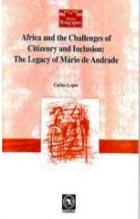L’Afrique face aux enjeux de la citoyenneté et de l’inclusion: l’héritage de Mário de Andrade
Synopsis
Auteur: Carlos Lopes
CODESRIA, ISBN: 978-2-86978-234-1; 39 pages, 2008
The Cheikh Anta Diop Lecture (CODESRIA General Assembly, Maputo, December 2005)
At the 11th General Assembly of CODESRIA, held in Maputo in December 2005, Carlos Lopes presented the Cheikh Anta Diop Lecture on “Africa and the Challenges of Citizenry and Inclusion”, through the legacy of Mario de Andrade of Angola.
He discusses the life and times of Mário Andrade; African nationalism and its revolutionary proposals; and the triumphs and vicissitudes of Negritude and Pan-Africanism. He analyses the consequences for a country’s citizenry, inclusion and respect for identities, and concludes with implications for African intellectuals. Like Mário Andrade, who abhorred the rites associated with power and despaired at exclusionary notions of citizenship, Lopes is critical of narrow nationalism that jeopardises pan-Africanism, and calls on African intellectuals to denounce these practices in the interest of universal identity rights, based on the principle that development brings with it greater opportunities and freedom of choice.
Téléchargements
Références
Ackerman, Robert John, 1996, Heterogeneities: Race, Gender, Class, Nation and State,
Amherst, MA: University of Massachussets Press.
Akindes, 2004, Les racines de la crise militaro-politique en Côte d’Ivoire, Dakar: CODESRIA.
Amaral, Ilídio do, 2000, Em torno dos nacionalismos africanos. Memórias e reflexões em homenagem a Mário Pinto de Andrade (1928–1990), Porto: Granito.
Amin, Samir, 1976, Le développement inégal, Paris, Maspero.
Amin, Samir, 2004, ‘Modernité et interpretations religieuses’, Africa Development, XXIX, no. 1, pp. 7–53, Dakar: CODESRIA.
Andrade, Mário Pinto, 1997a, Origens do nacionalismo Africano, Lisboa: Dom Quixote.
Andrade, Mário Pinto, 1997b, Uma entrevista a Michel Laban, Lisboa: JSC.
Andrade, Mário de and Ollivier, Marc, 1974, A Guerra em Angola, Lisboa, Seara Nova
Andrade, Mário de, 1980, Amílcar Cabral, Paris: Maspero.
Anjos, Jose Carlos Gomes dos, 2003, ‘Elites intelectuais e a conformação da identidade nacional em Cabo Verde’, Estudos Afro-asiáticos, ano 25, número 3, pp. 579–96, Rio de Janeiro: Universidade Cândido Mendes.
Ake, Claude, 1996, Democracy and Development in Africa, Dakar: CODESRIA.
Appiah, K. A., 1992, In My Father’s House: Africa in the Philosophy and the Order of Knowledge,New York: Oxford University Press.
Cabral, Amílcar, 1977, Unidade e Luta, 2 vols, Lisboa: Seara Nova.
Cardoso, Carlos, Macamo, Elísio and Pestana, Nelson, 2002, ‘Da possibilidade do político na África lusófona. Alguns subsídios teóricos’, Cadernos de Estudos Africanos,numero 3, pp. 7–26, Lisboa: CEA/ISCTE.
Chabal, Patrick and Daloz, Jean-Pascal, 1999, Africa Works: Disorder as Political Instrument,London: James Currey.
Chauí, Marilena, 2004, O que é ideologia, São Paulo: Editora Brasiliense.
Crehan, Kate, 2002, Gramsci: Cultura e antropologia, Lisboa: Campo da Comunicação.
Diop, Cheikh Anta, 1982, ‘L’unité d’origine de l’espèce humaine’, in Actes du colloque d’Athènes: Racisme science et pseudo-science, coll. Actuel, pp. 137–41, Paris: UNESCO.
Hountondji, Paulin, 2004, ‘Philosophie et politique. Pour une discussion avec Lansana
Keita’, Africa Development, XXIX, no. 1, pp. 95–106.
Londsdale, John, 2005, ‘African Studies, Europe and Africa’, mimeo presented at AEGIS Conference, London: 30 June.[Lopes, Carlos (ed.)], 1989, A construção da nação em Africa. Os exemplos de Angola, Cabo Verde, Guiné Bissau, Moçambique e S. Tomé e Príncipe,
Colóquio INEP/CODESRIA/Unitar, Bissau: INEP.
Lopes, Carlos (guest editor), 2005a, ‘Special Issue on Amílcar Cabral’, African Identities,London: Routledge.
Lopes, Carlos, 2005b, Cooperação e Desenvolvimento Humano, São Paulo: UNESP.
Macey, David, 2000, Frantz Fanon: a biography, New York: Picador.
Mafeje, Archie, 2001, ‘Anthropology in Post-independence Africa: End of an Era and the Problem of Self-redefinition’, African Social Scientists Reflections, part 1, Nairobi: Heirich Boll Foundation.
Mamdani, Mahmood, 1996, Citizen and Subject: Contemporary Africa and the Legacy of Late Colonialism, London: James Currey.
Mata, Inocência and Padilha, Laura, 2000, Mário Pinto de Andrade: um intelectual na política, Lisboa: Colibri.
Mbembe, Achille, 1999, ‘Getting Out of the Ghetto: The Challenge of Internationalization’, CODESRIA Bulletin 3–4, pp. 17–28, Dakar, CODESRIA.
Mbembe, Achille, 2000, ‘African Modes of Self-writing’, Public Culture, 14, no. 1, pp. 239–74, Duke University Press.
Mkandawire, Thandika, 2004, ‘Good Governance’, D+C, 31, no. 10, Germany: D+C.
Mkandawire, Thandika (ed.), 2005, African Intellectuals, London: Zed Books.
Mudimbe, V. Y., 1994, The Idea of Africa, London: James Currey.
Olukoshi, Adebayo and Nyamnjoh, Francis, 2004, ‘Editorial’, CODESRIA Bulletin, no. 1–2, pp. 1–2, Dakar: CODESRIA.
Pereira, José Maria Nunes, 1990, ‘O legado de Mário de Andrade’, Estudos Afro-Asiáticos, número 19, pp. 3–5, Rio de Janeiro: Universidade Candido Mendes.
Pillay, Suren, 2004, ‘The Mask of Race? Thinking About Race After Apartheid: A Response to Fred Hendricks’, CODESRIA Bulletin, no. 1–2, pp. 4–7, Dakar: CODESRIA.
Pimenta, Fernando Tavares, 2005, Brancos de Angola. Autonomismo e Nacionalismo (1900–1961), Lisboa: Minerva.
Ridley, Edgar J., 1992, An African Answer: The Key to Global Productivity, Trenton, NJ: Africa World Press.
Robins, Steven, 2004, ‘The (Third) World is a Ghetto? Looking for a Third Space Between “Postmodern” Cosmopolitan and Cultural Nationalism’, CODESRIA Bulletin, no. 1–2, pp. 18–26, Dakar: CODESRIA.
Said, Edward, 1997, Orientalism, Piscataway, NJ: Rutgers University Press [first published 1978].
Sen, Amartya, 2002, Desenvolvimento como liberdade, São Paulo, Companhia das Letras Shivji, Issa G., 1989, The Concept of Human Rights in Africa, Dakar: CODESRIA.
Singer, Peter, 2004, Um só mundo: a ética da globalização, São Paulo: Martins Fontes.
Whitaker, Beth Elise, 2005, ‘Citizens and Foreigners: Democratization and the Politics of Exclusion in Africa’, African Studies Review, 48, no. 1, pp. 109–26, New Jersey: ASA.
Zeleza, P. T. , 1997, Manufacturing African Studies and Crises, Dakar: CODESRIA. For a more detailed bibliography of and about Mário de Andrade, see: Kajibanga, Victor, ‘Mário Pinto de Andrade: subsídios para o estudo biográfico’, in Mata et al., 2000.






